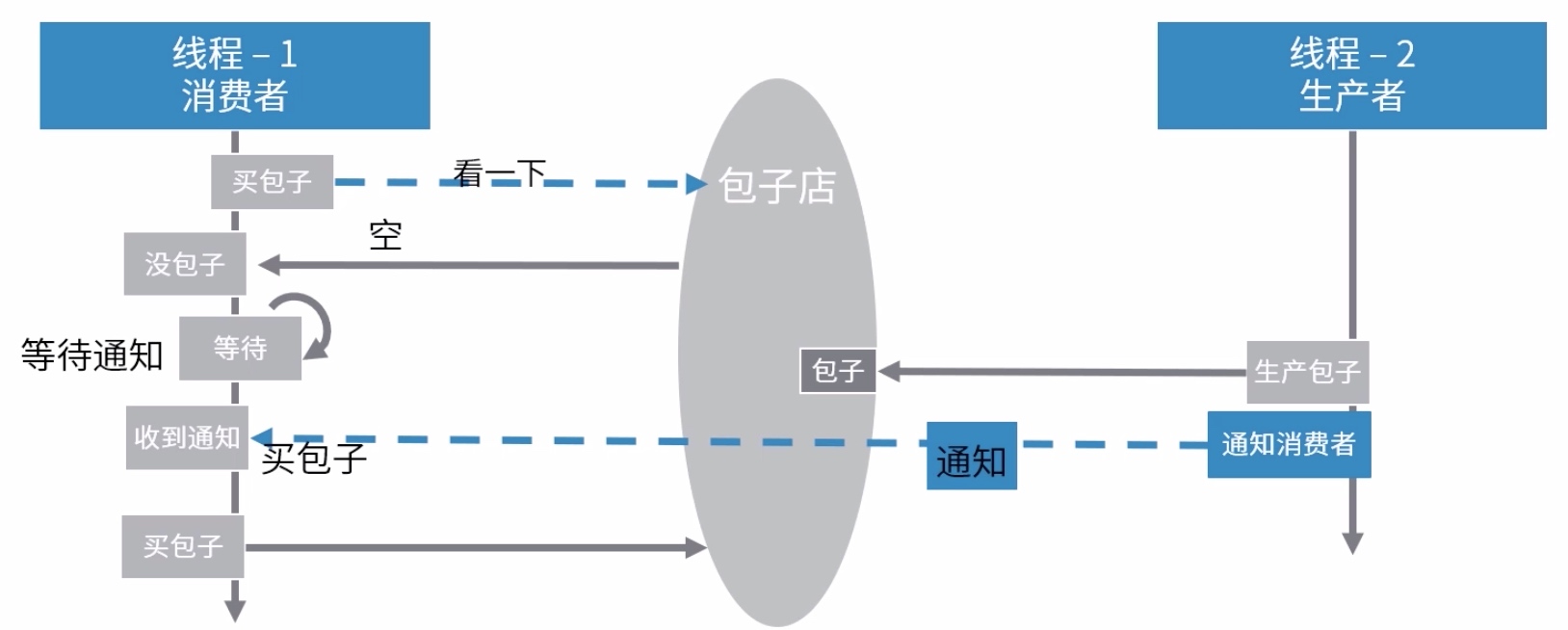多线程 - 线程通信 suspend-resume wait-notify park-unpark 伪唤醒
线程通信(如 线程执行先后顺序,获取某个线程执行的结果等)有多种方式:
- 文件共享 线程1 --写入--> 文件 < --读取-- 线程2
- 网络共享
- 变量共享 线程1 --写入--> 主内存共享变量 < --读取-- 线程2
- jdk提供的线程协调API
suspend/resumewait/notify park/unpark。
线程协作 - JDK API
线程协作的典型场景:生产者-消费者 模型(线程阻塞、线程唤醒)
如:线程1去卖包子,没有包子,则不再执行,线程2生产包子,通知线程1继续执行

API - 被弃用 suspend/resume
suspend挂起目标线程,resume恢复线程执行。
如下正常情况:
import java.util.concurrent.locks.LockSupport;
public class ThreadInteration {
public static Object baozidian =null;
public static void main(String[] args) throws InterruptedException {
new ThreadInteration().suspendResumeTest();
}
/**
* 使用弃用的API suspend和resume 来挂起目标线程和恢复线程执行
* 这两个api容易写出死锁的代码。
* 1,使用同步锁的时候,因为suspend不会释放锁,这样会导致死锁。
* 2,suspend 和 resume 的执行顺序颠倒,会导致死锁。
*/
//正常suspend 和 resume
public void suspendResumeTest() throws InterruptedException {
Thread consumerThread =new Thread(()->{
if (baozidian==null){
System.out.println("1 进入等待,线程被挂起");
Thread.currentThread().suspend();
System.out.println("线程被唤醒了");
}
System.out.println("3 买到包子了,回家!");
});
consumerThread.start();
Thread.sleep(3000L);
//生产者创建
baozidian=new Object();
consumerThread.resume();
System.out.println("2 通知消费者,消费者线程被唤醒");
}
}
死锁情况:
import java.util.concurrent.locks.LockSupport;
public class ThreadInteration {
public static Object baozidian =null;
public static void main(String[] args) throws InterruptedException {
new ThreadInteration().suspendResumeDeadLockTest();
// new ThreadInteration().suspendResumeDeadLockTest2();
}
/**使用同步锁导致死锁,suspend和resume不会像wait一样释放锁**/
public void suspendResumeDeadLockTest() throws InterruptedException {
//创建线程
Thread consumerThread=new Thread(()->{
if (baozidian==null){//如果没有包子,就进入等待
//当前线程拿到锁,线程被挂起
synchronized (this){
System.out.println("1 进入等待,线程被挂起");
Thread.currentThread().suspend();
System.out.println("线程被唤醒了");
}
}
System.out.println("3 买完包子,回家");
});
consumerThread.start();
Thread.sleep(2000L);
//产生包子
baozidian=new Object();
//争取到锁后,再恢复consumerThread()。
synchronized (this){
consumerThread.resume();
}
System.out.println("2 通知消费者,消费者线程被唤醒");
}
/** 由于suspend/resume的调用顺序,导致程序永久死锁 **/
public void suspendResumeDeadLockTest2() throws InterruptedException {
Thread consumerThread=new Thread(()->{
if (baozidian==null){
System.out.println("1 进入线程,线程被挂起");
try {
Thread.sleep(5000L);
} catch (InterruptedException e) {
e.printStackTrace();
}
//这里的suspend是运行在resume之后
Thread.currentThread().suspend();
System.out.println("线程被唤醒了");
}
System.out.println("3 买完包子,回家");
});
consumerThread.start();
Thread.sleep(2000L);
baozidian=new Object();
consumerThread.resume();
System.out.println("2 通知消费者,消费者线程被唤醒");
consumerThread.join();
}
}
API - wait/notify
import java.util.concurrent.locks.LockSupport;
public class ThreadInteration {
public static Object baozidian =null;
public static void main(String[] args) throws InterruptedException {
new ThreadInteration().waitNotifyTest();
// new ThreadInteration().waitNotifyDeadLockTest();
}
/**
* API推荐的 wait/notify 机制来挂起线程和唤醒线程
* 这些方法一定要是在同一锁对象的持有者线程调用。也就是写在同步代码块里面,否则会抛出IllegalMonitorStateException.
* wait方法就是将线程等待,调用wait就是把对象加入到 等待集合 中。并且放弃当前持有的锁对象
* notify/notify唤醒一个或者所有正在等待这个对象锁的进程。
*
* wait虽然会释放锁,但是对调用的顺序有要求。如果notify先与wait调用,线程会一直处于waiting状态。
*/
public void waitNotifyTest() throws InterruptedException {
new Thread(()->{
if (baozidian==null){
System.out.println("1 进入等待,线程将会被挂起");
synchronized (this){//顺序1 获取到锁
try {
this.wait();//顺序2 线程挂起,释放了锁
} catch (InterruptedException e) {
e.printStackTrace();
}
}
System.out.println("线程被唤醒了");
}
System.out.println("3 买到包子,回家");
}).start();
Thread.sleep(2000L);
baozidian=new Object();
synchronized (this){//顺序3 主线程拿到了锁
this.notify();//顺序4 主线程进行唤醒
}
System.out.println("2 通知消费者,消费者线程被唤醒");
}
public void waitNotifyDeadLockTest() throws InterruptedException {
new Thread(()->{
if (baozidian==null){
try {
Thread.sleep(5000L);//顺序1
} catch (InterruptedException e) {
e.printStackTrace();
}
System.out.println("1 进入等待,线程被挂起");
synchronized (this){
try {
this.wait();//顺序4 先唤醒了,再进行休眠。导致死锁
} catch (InterruptedException e) {
e.printStackTrace();
}
}
System.out.println("线程被唤醒了");
}
System.out.println("3 买到包子,回家");
}).start();
Thread.sleep(2000L);//顺序2
baozidian=new Object();
synchronized (this){
this.notify();//顺序3
}
System.out.println("2 通知消费者,消费者线程被唤醒");
}
}
API - park/unpark
这个是许可模式,同步代码中不能主动释放锁,许可模式是一个标记位,不能叠加
import java.util.concurrent.locks.LockSupport;
public class ThreadInteration {
public static Object baozidian =null;
public static void main(String[] args) throws InterruptedException {
new ThreadInteration().parkUnparkTest();
// new ThreadInteration().parkUnparkDeadLockTest();
}
/**
* 线程调用 park 表示线程等待"许可",unpack 表示为指定的线程提供"许可"
* park和 unpark 对调用顺序没有要求。
* 多次调用 unpack 之后,再调用 pack ,线程会立即执行。
* 但是这个"许可"不是叠加的,是一个标志位。
* 例如多次调用了 unpack 这个时候也只有一个"许可",这个时候调用一次 park 就会拿到"许可"直接运行。后面的 park 还是得继续等待
*/
public void parkUnparkTest() throws InterruptedException {
Thread consumerThread=new Thread(()->{
if (baozidian==null){
// try {
// Thread.sleep(5000L);
// } catch (InterruptedException e) {
// e.printStackTrace();
// }
System.out.println("1 进入等待,线程被挂起");
LockSupport.park();
System.out.println("线程被唤醒了");
}
System.out.println("3 买到包子,回家");
});
consumerThread.start();
Thread.sleep(2000L);
baozidian=new Object();
LockSupport.unpark(consumerThread);
System.out.println("2 通知消费者,消费者线程被唤醒");
}
/** park/unpark 不能自动释放锁**/
public void parkUnparkDeadLockTest() throws InterruptedException {
Thread consumerThread=new Thread(()->{
if (baozidian==null){
System.out.println("1 进入等待,线程被挂起");
synchronized (this){//这个时候park获取了锁,然后挂起了。没有及时释放锁导致后面的unpark获取不到锁,就执行不了unpark
LockSupport.park();
}
System.out.println("线程被唤醒了");
}
System.out.println("3 买到包子,回家");
});
consumerThread.start();
Thread.sleep(2000L);
baozidian=new Object();
synchronized (this){
LockSupport.unpark(consumerThread);
}
System.out.println("2 通知消费者,消费者线程被唤醒");
}
}
伪唤醒
/**
* 伪唤醒:前面使用了if (baozidian==null) 来判断是否进入等待状态,是错误的。是指并非由notify/unpack来唤醒的,由更底层的原因被唤醒。
* 官方建议使用while (baozidian==null) 来判断是否进入等待状态。
* 因为:处于底层的线程可能会收到错误警报和伪唤醒,如果不在循环中检查,程序可能会在没有满足条件的情况下退出
* 解决方案就是将上面的if全部改成while
*/
public void waitNotifyGoodTest() throws InterruptedException {
new Thread(()->{
synchronized (this){
//将while放入同步锁中判断
while (baozidian==null){
System.out.println("1 进入等待,线程将会被挂起");
try {
this.wait();
} catch (InterruptedException e) {
e.printStackTrace();
}
}
System.out.println("线程被唤醒了");
}
System.out.println("3 买到包子,回家");
}).start();
Thread.sleep(2000L);
baozidian=new Object();
synchronized (this){
this.notify();
}
System.out.println("2 通知消费者,消费者线程被唤醒");
}


